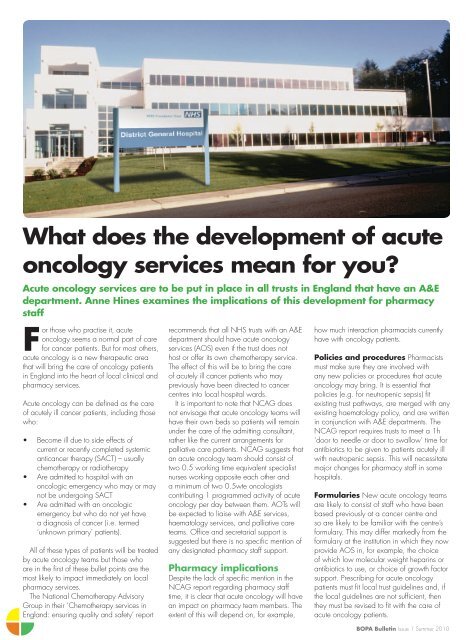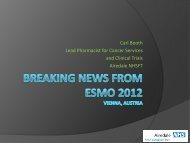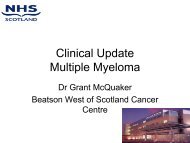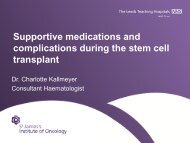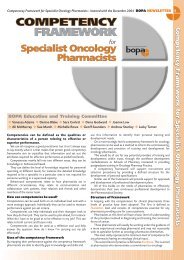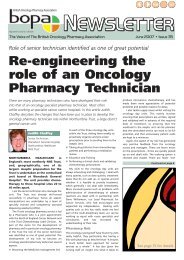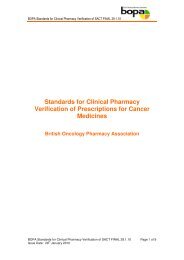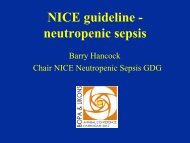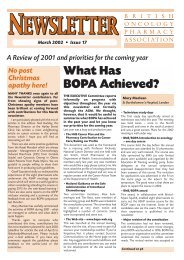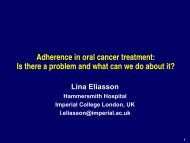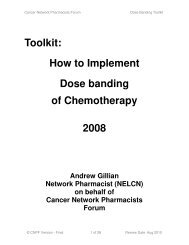What might the current Westminster Government mean for ... - BOPA
What might the current Westminster Government mean for ... - BOPA
What might the current Westminster Government mean for ... - BOPA
Create successful ePaper yourself
Turn your PDF publications into a flip-book with our unique Google optimized e-Paper software.
<strong>What</strong> does <strong>the</strong> development of acute<br />
oncology services <strong>mean</strong> <strong>for</strong> you?<br />
Acute oncology services are to be put in place in all trusts in England that have an A&E<br />
department. Anne Hines examines <strong>the</strong> implications of this development <strong>for</strong> pharmacy<br />
staff<br />
For those who practise it, acute<br />
oncology seems a normal part of care<br />
<strong>for</strong> cancer patients. But <strong>for</strong> most o<strong>the</strong>rs,<br />
acute oncology is a new <strong>the</strong>rapeutic area<br />
that will bring <strong>the</strong> care of oncology patients<br />
in England into <strong>the</strong> heart of local clinical and<br />
pharmacy services.<br />
Acute oncology can be defined as <strong>the</strong> care<br />
of acutely ill cancer patients, including those<br />
who:<br />
• Become ill due to side effects of<br />
<strong>current</strong> or recently completed systemic<br />
anticancer <strong>the</strong>rapy (SACT) – usually<br />
chemo<strong>the</strong>rapy or radio<strong>the</strong>rapy<br />
• Are admitted to hospital with an<br />
oncologic emergency who may or may<br />
not be undergoing SACT<br />
• Are admitted with an oncologic<br />
emergency but who do not yet have<br />
a diagnosis of cancer (i.e. termed<br />
‘unknown primary’ patients).<br />
All of <strong>the</strong>se types of patients will be treated<br />
by acute oncology teams but those who<br />
are in <strong>the</strong> first of <strong>the</strong>se bullet points are <strong>the</strong><br />
most likely to impact immediately on local<br />
pharmacy services.<br />
The National Chemo<strong>the</strong>rapy Advisory<br />
Group in <strong>the</strong>ir ‘Chemo<strong>the</strong>rapy services in<br />
England: ensuring quality and safety’ report<br />
recommends that all NHS trusts with an A&E<br />
department should have acute oncology<br />
services (AOS) even if <strong>the</strong> trust does not<br />
host or offer its own chemo<strong>the</strong>rapy service.<br />
The effect of this will be to bring <strong>the</strong> care<br />
of acutely ill cancer patients who may<br />
previously have been directed to cancer<br />
centres into local hospital wards.<br />
It is important to note that NCAG does<br />
not envisage that acute oncology teams will<br />
have <strong>the</strong>ir own beds so patients will remain<br />
under <strong>the</strong> care of <strong>the</strong> admitting consultant,<br />
ra<strong>the</strong>r like <strong>the</strong> <strong>current</strong> arrangements <strong>for</strong><br />
palliative care patients. NCAG suggests that<br />
an acute oncology team should consist of<br />
two 0.5 working time equivalent specialist<br />
nurses working opposite each o<strong>the</strong>r and<br />
a minimum of two 0.5wte oncologists<br />
contributing 1 programmed activity of acute<br />
oncology per day between <strong>the</strong>m. AOTs will<br />
be expected to liaise with A&E services,<br />
haematology services, and palliative care<br />
teams. Office and secretarial support is<br />
suggested but <strong>the</strong>re is no specific mention of<br />
any designated pharmacy staff support.<br />
Pharmacy implications<br />
Despite <strong>the</strong> lack of specific mention in <strong>the</strong><br />
NCAG report regarding pharmacy staff<br />
time, it is clear that acute oncology will have<br />
an impact on pharmacy team members. The<br />
extent of this will depend on, <strong>for</strong> example,<br />
how much interaction pharmacists <strong>current</strong>ly<br />
have with oncology patients.<br />
Policies and procedures Pharmacists<br />
must make sure <strong>the</strong>y are involved with<br />
any new policies or procedures that acute<br />
oncology may bring. It is essential that<br />
policies (e.g. <strong>for</strong> neutropenic sepsis) fit<br />
existing trust pathways, are merged with any<br />
existing haematology policy, and are written<br />
in conjunction with A&E departments. The<br />
NCAG report requires trusts to meet a 1h<br />
‘door to needle or door to swallow’ time <strong>for</strong><br />
antibiotics to be given to patients acutely ill<br />
with neutropenic sepsis. This will necessitate<br />
major changes <strong>for</strong> pharmacy staff in some<br />
hospitals.<br />
Formularies New acute oncology teams<br />
are likely to consist of staff who have been<br />
based previously at a cancer centre and<br />
so are likely to be familiar with <strong>the</strong> centre’s<br />
<strong>for</strong>mulary. This may differ markedly from <strong>the</strong><br />
<strong>for</strong>mulary at <strong>the</strong> institution in which <strong>the</strong>y now<br />
provide AOS in, <strong>for</strong> example, <strong>the</strong> choice<br />
of which low molecular weight heparins or<br />
antibiotics to use, or choice of growth factor<br />
support. Prescribing <strong>for</strong> acute oncology<br />
patients must fit local trust guidelines and, if<br />
<strong>the</strong> local guidelines are not sufficient, <strong>the</strong>n<br />
<strong>the</strong>y must be revised to fit with <strong>the</strong> care of<br />
acute oncology patients.<br />
<strong>BOPA</strong> Bulletin Issue 1 Summer 2010


